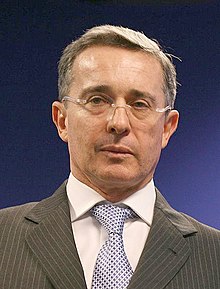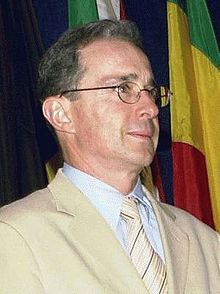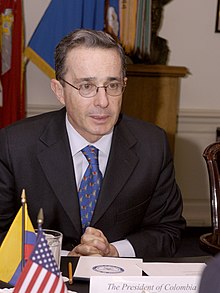Álvaro Uribe Vélez
Álvaro Uribe Vélez [ ˈalβaɾo uˈɾiβe ˈbeles ] (born July 4, 1952 in Medellín ) is a Colombian politician . From 2002 to 2010 he was the 31st President of Colombia .
biography
family
Álvaro Uribe Vélez is the first of five sons of the large landowner Alberto Uribe Sierra and his wife Laura Vélez. He is married to Lina Moreno, with whom he has two sons, Tomás and Jerónimo. His father was murdered in 1983 under unexplained circumstances. According to Álvaro Uribe, his father was murdered by the FARC guerrilla while trying to escape an impending kidnapping . However, a 1991 report by the US Defense Intelligence Agency DIA cited his links to drug trafficking as the reason for his murder. The report on "the most important Colombian drug traffickers employed by the Colombian drug cartels for the security, transport, distribution, collection and strengthening of drug operations," lists Álvaro Uribe as number 82. Uribe also worked for the Medellín cartel and is a one "Close personal friend of Pablo Escobar ". At the time, he supported Escobar in his political campaign to get a seat as a deputy member of parliament. Escobar was running on the lists of the liberals in Medellín , for which Álvaro Uribe again ruled as mayor of Escobar's "place of business" Medellín.
education
Uribe studied law and political science at the Universidad de Antioquia . After graduating, he went on to study at Harvard and Oxford .
Political career
In 1976, Uribe became Treasurer of Public Enterprises in Medellín. From 1977 to 1978 he was Secretary General in the Ministry of Labor and from 1980 to 1982 Director of Civil Aviation . In 1982 he was elected Mayor of Medellin, 1995 Governor of Antioquia . During Uribe's tenure (1994-1997) he supported the establishment of the so-called "Asociaciones Convivir" in the state. These private militia groups made the front against the guerrilla movement and have appeared in UNHCR reports in Colombia since 1998 as the nucleus of right-wing paramilitary groups. Under Uribe, Antioquia became their stronghold. The right-wing militia tortured and murdered alleged and actual members of the guerrilla movement as well as community representatives of the civil left-wing opposition party Unión Patriótica , 200,000 people were displaced. Documents filed against Chiquita in the spring of 2007 indicate that protection funds intended for the AUC were collected from Convivir units.
For the presidential elections on May 28, 2002 , Uribe ran as an independent candidate, although he was temporarily a member of the Liberal Party of Colombia . Uribe prevailed against the other candidates in the first ballot and was elected Colombian President with 53% of the vote. He replaced Andrés Pastrana Arango in office. In 2013 Uribe founded a new party, the Democratic Center , made up of members, supporters and several dissidents from the Partido Conservador Colombiano and the Partido Social de Unidad Nacional . The party calls itself centrist even though it is publicly classified as right-wing.
Presidency
Uribe is known for his crackdown in the fight against the guerrilla organizations FARC and ELN . Although his domestic political course is also highly controversial abroad, surveys show that his political support was very strong among the population during his first term in office. Until the end of his reign, Uribe enjoyed a popularity among the population that had never been seen before for a president in Colombia. His approval ratings always reached over 70%.
Guerrilla movement
His predecessor Andrés Pastrana Arango had tried to agree a ceasefire with the guerrilla groups. However, the negotiations failed. Uribe advocated an increased military presence and supported efforts by the United States Army to use military means to limit drug trafficking in Colombia.
Uribe opposed efforts by the ELN to establish a demilitarized zone in their guerrilla area. He justified this with the bad experiences that the government had made with such a zone - established in 1998 after negotiations with the FARC.
In the meantime, the zone demilitarized for the FARC is again under the control of the Colombian armed forces , which does not mean that the FARC are not still active in this area - as in many other areas of Colombia. The number of rebels fell from 20,000 in the 1990s to an estimated 8,000 now. Experts see the FARC as severely weakened. Other spectacular events in Uribe's politics were the killing of the FARC's deputy chief Raúl Reyes and the liberation of the politician Íngrid Betancourt, who had been held hostage for six years .
In the fight against drugs, the results are mixed: on the one hand, the government of Uribe confiscated more cocaine and destroyed more fields than ever before in Colombia's history; on the other hand, the acreage for coca bushes increased in 2007 compared to the previous year by 27%, while the price of cocaine fell internationally.
Paramilitaries

Rafael García, the former IT chief of the presidential secret service DAS , testified in 2009 that Uribe knew that his agency had cooperated closely with the paramilitaries of the Autodefensas Unidas de Colombia (AUC).
On April 17, 2007, the MP Gustavo Petro presented incriminating evidence based on official documents and affidavits from former militia officers, according to which two country estates of the Uribe family in the Departamento de Antioquia served as meeting points for paramilitary groups, from which they started their raids at night and killed. In 2008, arrested paramilitary Francisco Villalba told the Attorney General and House of Representatives that Santiago and Uribe were implicated in the 1997 El Aro Antioquia massacre. In the municipality of El Aro, 17 residents were tortured, murdered and dismembered, 42 houses were set on fire, 1200 cattle were stolen and the entire population was driven from the village. Villalba testified that the Uribe brothers, paramilitary chief Salvatore Mancuso , military officers and himself met to plan the operation, the ultimate aim of which was to free some of the guerrilla abductees. Villalba was killed three months after the public confession. In 2010, a former police officer revealed to a commission of lawyers and human rights defenders in Argentina that Álvaro Uribe's younger brother, Santiago Uribe, was responsible in the 1990s for organizing a group of paramilitaries charged with over 50 murders in an area where the large estate of the Uribe family lies. Álvaro Uribe was governor of the state in question at the time and stood by the group. With his help, the lawsuit against all members and collaborators was stopped.
91 members of the Congress were investigated for their collaboration with the radical right-wing militias. Leading members of the AUC had testified that a third of the MPs in the House of Representatives and the Senate had ties to the paramilitaries or were even elected with their help. In view of these conditions and the human rights violations that continue to take place in Colombia, MEPs from the socialist, social democratic and green groups in the European Parliament protested during a visit to Uribe in spring 2004. They left the room as Uribe was about to begin his speech.
According to critics from Human Rights Watch , the alleged demobilization of the paramilitary is a farce. At the beginning of the process in 2004, the research institute Indepaz from Bogotá determined the existence of around 13,000 paramilitaries. According to the government, 31,671 were demobilized. At the same time, human rights organizations assume the existence of 9,000 paramilitaries. The human rights organization Human Rights Watch laments the impunity in the demobilization process, points to the continued existence of paramilitary groups and denounces the infiltration of paramilitarism up to the highest levels of the political system.
elections
Since 2003 Álvaro Uribe has tried to allow his re-election, but the 1991 constitution did not allow this. A court ruling of October 19, 2005 enabled him to run for 2006 together with the law "Ley de Garantías", which was passed on November 1, 2005 and confirmed by the Constitutional Court on November 11, 2005. On November 27, 2005 Uribe gave his Candidacy known. In retrospect, the constitutional amendment got a negative aftertaste from the statement by the Conservative MP Yidis Medina that she had been bribed. Although the Supreme Court sentenced her to four years in prison for bribery, the constitutional amendment itself remained unaffected.
On May 28, 2006, Uribe was confirmed in office by 62.2% of voters in the first round of voting. That is the highest value that a president in Colombia has achieved in the last 80 years. In absolute terms, too, Uribe was ahead of all of its predecessors with 7.3 million votes. The voter turnout was 45% below that of the last 20 years.
The planned holding of a referendum to allow Uribe to be re-elected a second time was declared illegal by the Colombian Supreme Court on February 26, 2010.
Dealing with critical journalists
The Bogotá correspondent for the El Nuevo Herald newspaper , Gonzalo Guillén , received anonymous threats in 2007 after he published his research on Uribe and then left Colombia on October 7, 2007. These threats are believed to stem from the clash between Guillén and Uribe .
Awards
Álvaro Uribe Vélez received the Presidential Medal of Freedom from President George W. Bush .
Immediately after the end of his term as President of Colombia, Álvaro Uribe was appointed Vice-President of the Commission of Inquiry into the attack on the Gaza flotilla by the United Nations Secretary-General Ban Ki-moon , which sparked protests worldwide.
literature
- Raul Zelik / Dario N. Azzellini : Colombia-Big Business, State Terror and Insurgency . Isp-Verlag, 1999, ISBN 3-929008-48-3 (PDF file; 1.4 MB)
- US Intelligence Listed Colombian President Uribe Among "important Colombian Narco-Traffickers" in 1991
- Álvaro Uribe Vélez , in: Internationales Biographisches Archiv 33/2010 from August 17, 2010, in the Munzinger archive ( beginning of article freely available)
Web links
- Sabine Kurtenbach: Security first: a balance sheet of state-building in Colombia , GIGA Focus Latin America 6/2010, ISSN 1862-3573 (PDF; 458 kB)
- Trapped in the jungle: The kidnapping of Ingrid Betancourt ( Memento from August 22, 2010 in the Internet Archive ), ARD Mediathek, SWR / WDR broadcast from August 17, 2010 | 10:45 p.m.
swell
- ^ National Security Archive: US Intelligence Listed Colombian President Uribe Among "Important Colombian Narco-Traffickers" in 1991 , August 1, 2004
- ↑ Tommy Ramm: Place for Paramilitaries and Drug Dealers ( Memento from December 17, 2004 in the Internet Archive ). Telepolis, May 28, 2002
- ^ Documents Implicate Columbian Government in Chiquita Terror Scandal National Security Archive
- ^ Profiles: Alvaro Uribe Velez ( English ) BBC News . May 29, 2006. Retrieved March 4, 2008.
- ^ Gallup Poll 82, p. 66 ( Spanish ) Invamer Gallup Colombia. May 2011. Retrieved April 7, 2013.
- ↑ Carsten Wieland: The beginning of the end of the FARC? kas.de, accessed on April 23, 2019
- ↑ Colombia's coca crop booms despite US-backed crackdown In: The Guardian , June 19, 2008
- ↑ Ex director del DAS ratificó colaboración colombiana en planes contra Venezuela . In: TeleSUR. September 7, 2009, archived from the original on September 12, 2009 ; Retrieved May 12, 2010 .
- ↑ M. Daniljuk: Venezuela is investigating the Colombian secret service . In: amerika21 . September 28, 2009, accessed May 12, 2010 .
- ^ Raul Zelik : Colombia: Right-wingers are firmly in the saddle in the election year . In: Rosa Luxemburg Foundation. April 2010, accessed May 12, 2010 .
- ↑ Christian Schmidt-Häuer: The savior from the drug forest . In: The time. July 10, 2008, accessed May 30, 2010 .
- ↑ Hans Weber: Suspicion: Uribe's brother, head of the paramilitary group . In: amerika21. June 3, 2010, accessed June 5, 2010 .
- ^ M. Daniljuk: Colombia before the election. In: amerika21. May 29, 2010. Retrieved November 28, 2017 .
- ↑ HRW (PDF; 181 kB) ( Memento from January 21, 2012 in the Internet Archive )
- ↑ Indepaz
- ↑ Letter to President Álvaro Uribe . Human Rights Watch. May 2, 2007. Retrieved May 7, 2011.
- ↑ GIGA Focus 10/2008 Constitutional crisis in Colombia? The dispute between the president and the judiciary escalates at giga-hamburg.de, accessed on April 23, 2019
- ↑ South America: Uribe wins re-election in Colombia . FAZ.NET . May 29, 2006. Retrieved May 7, 2011.
- ^ M. Daniljuk: Colombia: No re-election for Uribe. In: amerika21. February 27, 2010, accessed February 27, 2010 .
- ↑ Klaus Ehringfeld: The tantrums of the President . In: Berliner Zeitung , October 15, 2007.
- ↑ President Bush Honors Presidential Medal of Freedom Recipients georgewbush-whitehouse.archives.gov, accessed April 23, 2019
- ↑ Malte Daniljuk: Protest against UN job for Álvaro Uribe. In: amerika21. August 11, 2010. Retrieved August 11, 2010 .
| predecessor | Office | successor |
|---|---|---|
| Andrés Pastrana |
President of Colombia 2002-2010 |
Juan Manuel Santos |
| personal data | |
|---|---|
| SURNAME | Uribe Vélez, Álvaro |
| BRIEF DESCRIPTION | Colombian politician and President of the Republic of Colombia |
| DATE OF BIRTH | 4th July 1952 |
| PLACE OF BIRTH | Medellin , Colombia |



